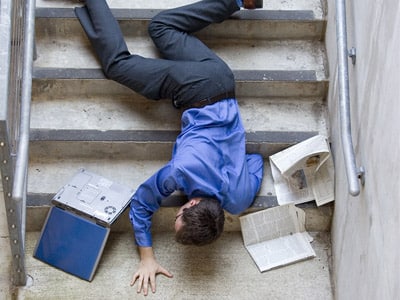 Slip, trip, and fall accidents are all too common in the workplace. STFs, as they are commonly referred to, compromise more than employees’ health. Employees or patrons who suffer an STF-related injury might experience long-term pain, permanent disability, depression, high medical expenses, or even death. Beyond physical injury alone, the cost of STFs to employers and building management is high. Loss of efficiency, higher insurance premiums, and overheads associated with replacement workers are common after an injury in the workplace.
Slip, trip, and fall accidents are all too common in the workplace. STFs, as they are commonly referred to, compromise more than employees’ health. Employees or patrons who suffer an STF-related injury might experience long-term pain, permanent disability, depression, high medical expenses, or even death. Beyond physical injury alone, the cost of STFs to employers and building management is high. Loss of efficiency, higher insurance premiums, and overheads associated with replacement workers are common after an injury in the workplace.
How Serious are Slip and Fall Accidents?
Unfortunately, slips and falls make up the majority of general industry accidents, and are the second cause of accidental deaths next to car accidents. There are roughly 12,000 accidental deaths due to slips and falls, and 15 percent of workplace accident claims each year are attributed to STF incidences. A whopping 17 percent of occupational injuries leaving employees permanently disables are due to these easily avoided occurrences.
Avoiding Staircase Accidents
According to the Occupational Safety and Health Administration (OSHA) staircase guidelines, every flight of stairs with four or more risers must be equipped with stair railings or standardized handrails. Standard railings have three main parts: top rails, intermediate rails, and posts. The top rails are smooth in texture and the entire height of the railing should hit 42 inches tall. Stair rails have posts that attach to the staircase itself while handrails attach to the walls. The stair railing should be between 30 and 34 inches. Further, wood railings must be at least 2 x 4 in size and posts at least or larger than 6 feet. Metal pipes should be at least 1-½ inches in diameter. Overall, all top railings should be equipped to withstand at least 200 pounds applied in any direction.
No matter how secure railings may be, a slick staircase is a recipe for disaster. Even if someone is able to avoid a fall by grasping onto a railing, he/she still risks twisting an ankle or hurting their back when attempting to catch themselves. Therefore, as a facility manager or business owner, you must install stair safety coverings to reduce the odds of slip and fall accidents in the workplace.
Keep your staircases slip-free with stair treads, including Eagle Mat’s circular disc model. The backs are sanded for easy installation and they are perfect for building stairways, landings, entryways, lobbies, hallways, and ramps.
For outdoor staircases that tend to get slick after rainfall are best outfitted with rubber stair treads. These fit almost any size outdoor tread, and are composed of 100 percent recycled tires. They come in a diamond pattern design and weigh about 1.75 lbs per linear square foot, but can be easily cut down with a utility knife. Make sure that during installation, stair treads are completely dry so the epoxy adhesive (#775) adheres correctly.
Everyone falls at one point or another, even the President of the United States. Watching someone fall (especially a poised, rather dignified icon) strikes funny. Perhaps it’s because it makes the prestigious appear more human and natural. While the general masses may be amused, there’s no denying that falls can lead to serious health issues no matter your age or physical wellbeing. The National Floor Safety Institute started the organization called, “Falls Aren’t Funny,” to enlighten audiences, and facility managers, on the more serious repercussions of accidental slips and trips.
If you’re motivated to get proactive in slip and fall prevention, start by helping your employees with stair safety. Contact Eagle Mat, where our team of facility management experts can help you determine the right stair coverings for your space. We offer free shipping and a price match guarantee. The safety of your patrons and employees is nothing to joke about, and it’s time to outfit your building to reflect that consideration.






